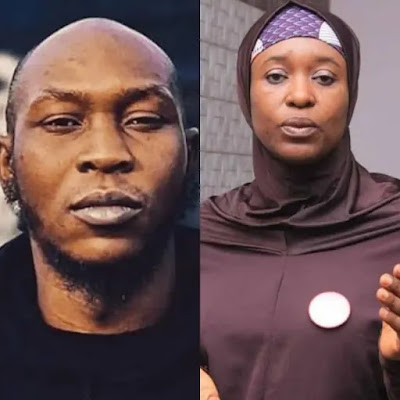Seun Kuti Criticizes Aisha Yesufu’s Advocacy for Women’s Freedom
Renowned Afrobeat artist Seun Kuti has sharply criticized Aisha Yesufu, the convener of the Bring Back Our Girls Movement, for her advocacy of women’s liberation in Nigeria. Kuti’s comments came during a recent television appearance where he openly disagreed with Yesufu’s stance on women’s rights and freedom. His remarks have sparked discussions about cultural identity and religious practices in the context of feminism.
Kuti questioned Yesufu’s credibility as an advocate for women’s freedom while she was wearing a hijab, which he argues symbolizes a departure from African identity. In a post on his official social media account, he expressed his belief that embracing religious practices, like Christianity or Islam, compromises one’s Africanness. He stated, “It’s the Africanness in us that is helping your European behaviour,” implying that adopting these religions influences how individuals engage with their cultural roots.
The Afrobeat musician’s comments reflect a broader conversation about cultural identity in Nigeria, particularly how it intersects with religion. He pointed out the irony of advocating for women’s liberation while adhering to practices that he sees as contradictory to African culture. Kuti’s provocative statement, “M**herf**ker liberates yourself from your Hijab first,” was aimed at challenging Yesufu to reconsider her position on women’s rights within the context of her own beliefs.
This clash between Kuti and Yesufu highlights the ongoing debate within Nigerian society about the role of religion and culture in the fight for women’s rights. Many activists, like Yesufu, argue that women should have the freedom to express themselves and their identities, whether through religious practices or cultural expressions. However, Kuti’s perspective raises questions about whether true liberation can coexist with religious symbolism that he believes undermines African identity.
The discussion has garnered attention on social media, with various opinions emerging from both sides of the argument. Supporters of Yesufu argue that her hijab is a personal choice and does not negate her advocacy for women’s rights. Conversely, Kuti’s supporters feel that his challenge to Yesufu is necessary for a deeper understanding of cultural authenticity in the fight for freedom.
As the dialogue continues, it serves as a reminder of the complexities surrounding women’s rights in Nigeria, where cultural and religious identities play significant roles. The ongoing debate may prompt further examination of how advocacy for women’s liberation can be aligned with a commitment to preserving African identity, leaving many to ponder the balance between personal beliefs and cultural heritage.








